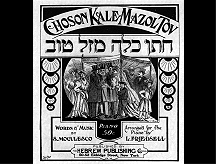 [WesMaps Home Page]
[Course Search]
[Course Search by CID]
[WesMaps Home Page]
[Course Search]
[Course Search by CID]
MUSC360
Westernization and National Music Identities
MUSC360 SP
Crosslistings: EAST360
| Section | Class Size | *Available | Times |
|---|
| 1 | 20 | 2 | Times: .T.T... 1:10PM-2:30PM; |
*The number of spaces listed as available is based on class seats open for
the current phase of registration. Some seats may be taken in previous
phases while others may be held out for subsequent phases of registration.
(Last Updated on Wed Mar 4 05:00:40 EST 1998
)
 Photo Caption and Credits
Photo Caption and Credits
This course will examine the impact of Western music and
musical thought on contemporary musical cultures in Japan
and China. In particular, it explores the historical
significance of the Meiji Restoration on Children's Song
Movement, the origins of Japanese contemporary music, the
Japanese influence on Chinese School Songs, the adaptation
and preservation of traditional music genres, the
development of new music since World War II, and the rise of
popular music and the music industry. We will focus on the
cultural conflicts and musical problems encountered by
Japanese and Chinese musicians and composers in search of
national music identities in the processes of East-West
interactions.
MAJOR READINGS
Max P. Baumann, MUSIC IN THE DIALOGUE OF
CULTURES: TRADITIONAL MUSIC AND CULTURAL POLICY
Thomas R. H. Havens, ARTIST AND PATRON IN POSTWAR JAPAN:
DANCE, MUSIC , THEATER, AND THE VISUAL ARTS, 1955-1980
Andrew F. Jones, LIKE A KNIFE: IDEOLOGY AND GENRE IN
CONTEMPORARY CHINESE POPULAR MUSIC
Komiya Toyotaka, JAPANESE MUSIC AND DRAMA IN THE MEIJI ERA
Richard C. Kraus, PIANOS AND POLITICS IN CHINA: MIDDLE-CLASS
AMBITIONS AND THE STRUGGLE OVER WESTERN MUSIC
Bonnie S. McDougall, POPULAR CHINESE LITERATURE AND
PERFORMING ARTS IN THE PEOPLE'S REPUBLIC OF CHINA, 1949-1979
Colin MacKerras & Constantine Tung, DRAMA IN THE PEOPLE'S
REPUBLIC OF CHINA
William P. Malm, SIX HIDDEN VIEWS OF JAPANESE MUSIC
Elizabeth May, THE INFLUENCE OF THE MEIJI PERIOD ON JAPANESE
CHILDREN'S MUSIC
Bruno Bettl, THE WESTERN IMPACT ON WORLD MUSIC: CHANGE,
ADAPTATION, AND SURVIVAL
Harrison Ryker, NEW MUSIC IN THE ORIENT: ESSAYS ON
COMPOSITION IN ASIA SINCE WORLD WAR II
Edward Seidensticker, LOW CITY, HIGH CITY: TOKYO FROM EDO TO
THE EARTHQUAKE
Konald H. Shively, TRADITION AND MODERNIZATION IN JAPANESE
CULTURE
Tokumaru Yosihiko, TRADITION AND ITS FUTURE IN MUSIC: REPORT
OF SIMS 1990 OSAKA
EXAMINATIONS AND ASSIGNMENTS
Six two-page papers on
assigned reading or listening. One final research paper.
ADDITIONAL REQUIREMENTS and/or COMMENTS
Unless
preregistered students attend the first class meeting or
communicate directly with the instructor prior to the first
class, they will be dropped from the class list. NOTE:
Students must still submit a completed Drop/Add form to the
Registrar's Office.
COURSE FORMAT: Discussion Lecture
REGISTRATION INFORMATION
Level: UG Credit: 1.00
Gen Ed Area & Dept: HA MUSC
Prerequisites:
None
- Section 01
- Zheng, S
- Times: .T.T... 1:10PM- 2:30PM;
- Grading Mode: A/F
- Registration Preference (1 high to 6 low, 0=Excluded) Sr: 1, Jr: 1, So: 1, Fr: 1
- Major Preference Given
Last Updated on MAR-03-1998
About the Photo:
Cover of a book of sheet music for a work by a Jewish
composer
Reference:
Slobin, Mark. TENEMENT SONGS. Urbana: University of
Illinois Press, 1991
Contact wesmaps@wesleyan.edu to
submit comments or suggestions.
Copyright Wesleyan University, Middletown, Connecticut, 06459
 Photo Caption and Credits
Photo Caption and Credits